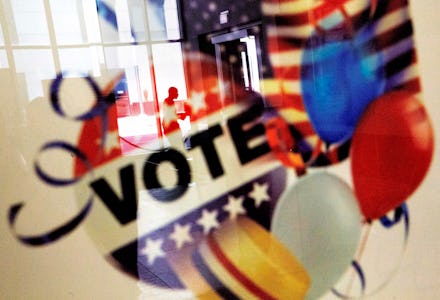A comprehensive guide to Election 2016: Key things to watch for throughout the day

It's Election Day in the United States, and the long national nightmare that's been 2016 will finally – hopefully — come to a close.
Election Day is usually a long day of pundits trying to fill airtime with little new data to go on.
Many reporters will fan out across the country to report on turnout at certain key locations, which could give clues as to what's going on on the ground. But mostly we'll all be flying blind for the vast majority of the day.
So to keep you occupied as you stress over how your candidate of choice may fare later on in the night, we here at Mic compiled a list of key things to watch throughout the day.
All times are Eastern.
6 a.m. — Polls open across the country.
The day begins at 6 a.m., when polls open in many states along the East Coast.
Right off the bat, we'll be able to see how turnout will look based on whether there are long or short lines in certain key pockets of crucial swing states.
Democratic nominee Hillary Clinton, who convention wisdom states will be helped by higher turnout across the country, spent Monday imploring her supporters to stay in lines to cast their ballots — even if the lines are long.
Lines and ballot access will be the story for the vast majority of the day.
6 p.m. — Polls start closing.
By now, the first polls will close.
Parts of Indiana and Kentucky have the earliest poll closing times at 6 p.m.
The next wave will close an hour later, with Georgia, South Carolina, Vermont, Virginia and nearly all of Florida closing at 7 p.m. (A small portion of the Florida Panhandle is in Central Standard Time, and polls there close at 8 p.m.)
Because Florida and Virginia are two crucial swing states, if early voting shows a clear lead for Clinton — which polling suggests — it will be a good sign that the race will be called pretty quickly once polls across the entire country close.
If Republican nominee Donald Trump keeps it close in early voting, it could be a long night.
7:05 p.m. — News organizations begin calling races and analyzing exit polling.
In 2012, the Associated Press called the first races at 7:05 p.m., according to Glen Bolger, a top Republican pollster.
Kentucky and Vermont were the first races called.
Because so much of the vote this year will have been cast during the early voting period, it will likely be clear early on in the night whether one candidate will be clearly winning or losing by this point.
Exit polls in states that have already closed will also be released by this time, which could show clear trends for how Clinton or Trump are faring in key states.
8 p.m. — Pundits start going through the five stages of grief.
By this time, polls in more than half the country will have closed, giving us a better idea of what's in store for the country.
And that means some partisan pundits, or even nonpartisan pundits whose predictions determine their reputations, will start the five stages of grief, the first of which is denial.
If their candidate is losing, or if their prediction models are not holding up, many of these pundits will begin to find ways to deny what's unfolding before their eyes.
In 2012, the most famous instance of this was Republican Karl Rove's meltdown on Fox News when the state of Ohio was called for President Barack Obama.
Rove, a former top aide to President George W. Bush, was convinced Obama would not win the state, and refused to believe the results in real time.
11 p.m. — Final polls close.
Polls in Electoral College rich states such as California, Oregon, Washington and Hawaii close at 11 p.m.
Based on how the states are looking from the previous rounds of poll closures, this could be the time the election is called.
By 11:15 p.m. in 2012, networks had called Ohio for Obama, and subsequently announced he had been re-elected as president of the United States.
Past midnight: Victory and concession speeches
While the presidential race may be called before midnight, victory and concession speeches likely won't happen for quite a while.
Each campaign will hold out to see what results are saying, and tweak their speeches accordingly.
In 2012, Obama took the stage in Chicago at 12:38 a.m. to deliver his victory speech.
Romney conceded shortly thereafter, at 12:55 a.m., according to a time stamp on CNN footage from the speech.
While it's still unclear how Trump will fare, he's refused to say whether he will accept the results of the election if he loses.
And Trump's team appears to not have written a concession speech, according to a report from New York magazine's Gabriel Sherman.